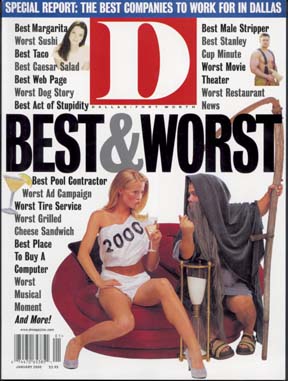DAVID TICE’S DETRACTORS LIKE TO JOKE that he has correctly predicted 30 of the last two bear markets. Those who aren’t joking simply say he’s nuts.
Tice runs the Prudent Bear Fund, one of only a handful of mutual funds that invests based on which companies will benefit when the economy cools or by which stock’s price will drop rather than rise. Tice also heads an investment research firm that recently made national news when it issued a report sharply critical of one of Wall Street’s darlings, conglomerate Tyco International, When Tyco’s stock price plunged, the company mounted a fierce counterattack. questioning Tice”s motives and calling for investigations by the SEC and the NYSE. Tice and Tyco CEO Dennis Kozlowski exchanged a flurry of insults on most of the financial news networks.
The brouhaha with Tyco was old news by the lime I went by to visit with him. He’s on to something bigger: “I am very, very confident that the economy is going to come apart with more than a 50 percent decline in the stock market,” Tice says with an almost eerie matter-of-factness.
Pause. Blink.
Can you put a time frame on that, I ask?
“It would shock us if it took any longer than June of this year,” he says. A 50 percent crash is difficult for investors to imagine. Most probably remember the 36 percent tumble that the Dow Jones took in October 1987, but the pain of [hat event has been dulled. perhaps even erased, by the euphoria of the steep climb that has followed. Cutting the value of the slock market in half, as Tice predicts, has almost no historic precedent. By the end of the Depression, the Dow was down 89 percent. Bui the initial crash of 1929 was a mere two-day tumble of 27 percent. In 1931, after the collapse of the United States banking industry, it took nearly 12 months for the Dow to fall 52 percent.
Tice goes further.
He says a 50-percent slash is conservative by his estimates. It wouldn’t surprise him al all if stock prices-along with all the 401 (k) plans, mutual funds, and individual retirement accounts that those prices represent-are worth just 30 cents on the dollar by middle of next year.
“This market is a bubble in search of a pin,” Tice says later. “And there’s going to he something that is going to prick it….This is the biggest mania we’ve ever seen. It’s definitely bigger than 1929.”
Tice has been beating the same drum for four years. He has become well known, some would say notorious, as an aggressive short seller. The only result has been that his clients have paid dearly. The Prudent Bear Fund has as performed dismally: In 1998 it was down 52 percent, more than what he predicts now for the market. In fact. since he began preaching his bearish gospel, the Dow Jones has doubled to its mid-November level of about 11,000.
“I consider myself an independent thinker.” he says, brushing off the results.
“I question the consensus.! realize there arc vested interests in all areas of life and there are incredibly powerful people who will occasionally pull out all the stops to get their way.” Tice also believes that Lee Harvey Oswald was not the lone gunman.
When lie’s not challenging the conventional wisdom of the overall market, Tice does it with individual companies. The firm’s offices in a nondescript office building near North Central Expressway may not be the home of bears, but they do resemble a rabbit warren. The receptionist guides me | through a trail down quiet halls and through the office-supplies room to Tice’s corner office. Folders and documents clutter his desk. Strewn on a nearby table are some books and magazines with intimidating titles such as The Theory of Money and Credit and The Quarterly Journal of Austrian Economy.
In the cubicles analysts are researching stocks for a report published every six weeks entitled Behind the. Numbers. Unlike most analysts’ reports, BTN focuses on overvalued companies that his clients should consider selling. Tice has about 200 institutional sub-scribers who pay $10,000 for an annua) subscription. In October one of Tice’s analysts, Albert Meyer, wrote the explosive report I (which Tice approved) on Tyco, until then a I company praised almost universally by stock analysts. The report challenged the quality of I Tyco’s earnings and seriously questioned its ’ complex accounting methods. Tyco’s stock plummeted 35 percent, losing about $30 billion in value, and management responded I with vehement rebuttals, Tyco held an “Accounting 101” class in New York for other analysts to explain the company’s intricate balance sheet and distributed videos of the conference to anyone who couldn’t attend. Authorities at the SEC and NTSE refuse to comment on the existence of any investigations, but it seems clear that at least one is underway. In November Tyco stock had I climbed about halfway back to its pre-Tice [ levels, trading at about $44 per share. “My personal opinion is that there will be long-term benefit,” says Brad McGecaTyco senior vice president and spokesman. ’This gives us an even stronger foundation and will make us less prone to the same thing happening in the future.” If you read it hint of concession in that, it was probably unintentional.
Controversy is not new for Tice. After earning a bachelor’s degree in accounting and a master’s in finance from Texas Christian University, he worked locally in the accounting and finance divisions for oil and gas companies Atlantic Richfield and ENSERCH. He then became a “financial counselor” with Dallas-based Concorde Financial, working with individual investors. He is a certified public accountant and chartered financial analyst.
At Concorde lie began to see a significant gap in the analysis of public stocks. He feels analysts tend to be biased, looking only for companies that their clients can buy. Tice realized his accounting and analytical expertise coupled with his inherent skepticism could fill a niche by looking for companies to unload. He has been publishing BTN for 12 years.”I started it working in a spare bedroom with a very supportive wife and a screaming baby.” Tice recalls. “1 essentially served as a truth squad for Wall Street.” Institutional money managers were willing to pay for his contrarian perspectives, Today he employs eight analysts who scan public slocks for companies that are ripe and ready to fall off the tree. Never before, however, did a single report cause a furor like the one on Tyco.
But reports on individual companies don’t seem to be what truly sparks Tice’s interest these days. The more we discussed his calamitous prediction for the stock market, the more animated he became. The same person who was 15 minutes before more interested in stock quotes is now excusing himself to pull books off the shelf, quoting passages and citing experts. It is about this time during the interview that I am beginning to feel a bit like one of those juvenile delinquents forced to listen about the horrors of prison in Scared Straight. Call it Scared Bearish.
The state of the economy is Tice’s passion. He lists indicator after economic indicator to explain why he believes-why he knows-that a crash is imminent. His primary culprit is credit. There’s too much of it. and it’s too easy to get,Tice says. His company recently organized a symposium in New York on “The Credit Bubble and Its Aftermath.” It featured a number of notable speakers and was favorably reviewed in many publications, including Business Week, Barron’s, and The Wall Street Journal.
And. to be fair, Tice is not alone. The New York Observer’s Christopher Byron. for one, has been ridiculing so-called momentum investing and pie-in-the-sky Internet valuations for years. The New York Times’ “Market Watch” column has been throwing darts in the same direction. Beyond Tice, however, the most pessimistic outlooks to be found only warn of a major correction, perhaps a 10 percent drop, similar to what occurred earlier this year. Other experts might fret about indicators such as consumer credit levels, trade deficits, price volatility, and absurd valuations for unproved technology stocks, but nobody of note foresees a total collapse.
“For someone running a bear fund, a major dip would be good news,” says Brian Bruce, a professor of investments at the Cox School of Business at Southern Methodist University. “You have to wonder if it is really a prediction or just wishful thinking.”
Tice is accustomed to questions about his objectivity. He says he is sounding the alarm to help individual investors reduce their exposure to risk and perhaps to persuade economic policy-makers to start taking action. “Look, I’m not a bullshitter.” he says, “I’m not saying all this just to sell my fund. We didn’t start the fund until 1996, and now the risk is higher than ever before. All these indicators are out there now that say it’s time to be careful. The mania is extremely powerful , and it’s hypnotizing. This market is 50 to 100 percent more overvalued than any market in history.”
Years of losses in his Prudent Bear Fund don’t add to Tice’s credibility, The fund swells and shrinks dramatically according to investor confidence in the economy. In October it reached some $240 million in assets, up from about $60 million 18 months earlier. By the end of November, however, investors had pulled $80 million out of the fund. Despite the dismal performance of the fund,Tice maintains he is providing a valuable alternative. (For doing so,Tice charges a rather modest management fee of 1.25 percent.)
Tice knows that predicting a catastrophic-crash in the midst of the greatest bull market in history is considered by some to be sheer lunacy. He evokes the names of legendary investors such as Dean Witter and Charlie Merrill, who were ridiculed when they warned of the dangerous overvaluations on Wall Street in 1928. Merrill was so traumatized, Tice says, that he was compelled to see a psychiatrist.
Whether Tice will have a place in history remains to be seen. He sounds today like another Chicken Little. Next month he could look like Noah. “If we’re wrong, or if we are way too early and the mania just keeps getting bigger, God help us all because it is just going to be that much worse when it ends,” Tice says. “But we’ll still be out there telling people that it’s going to happen.”
A bear must keep the faith.
Get our weekly recap
Brings new meaning to the phrase Sunday Funday. No spam, ever.
Related Articles

News
Medical City Opens ER in Garland and Local Dermatologist Named Youngest Ever President of the American Academy of Dermatology
Plus Health Wildcatters wins accelerator competition and DFW Hospital Council Foundation awards.
By Bridget Reis

Business
Wicked Bold Chocolate CEO and Comedian Deric Cahill on Why it Pays to Be Funny
The brand leans into humor, but the business' success is no laughing matter, with products in nearly 2,000 retail locations nationwide.
By Will Maddox

D CEO Award Programs
Nominations Open: D CEO’s 2024 Corporate Counsel Awards
The annual program honors top in-house attorneys in Dallas-Fort Worth, from outstanding up-and-comer to outstanding general counsel.


